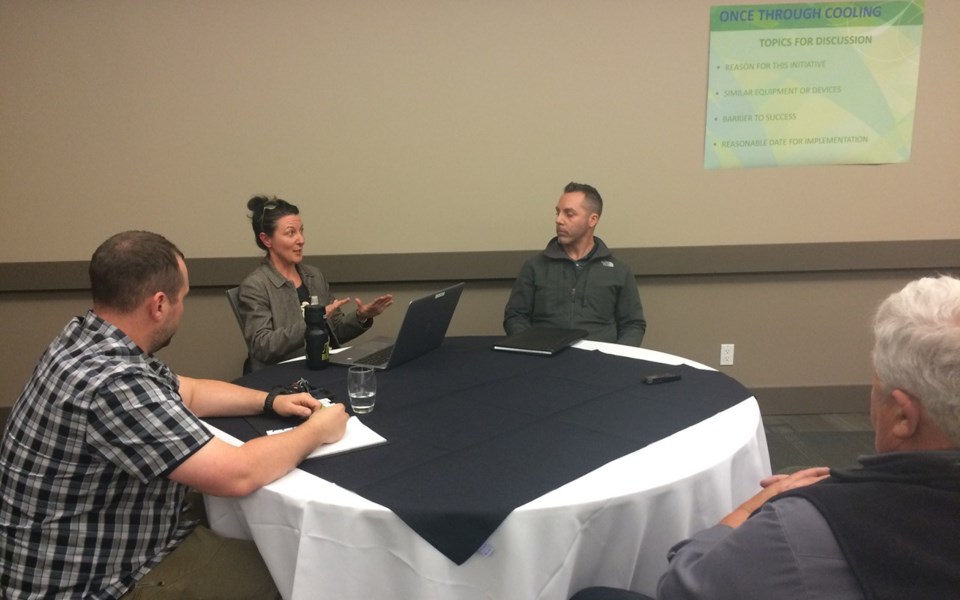The Resort Municipality of Whistler (RMOW) is moving ahead with its plan to phase out once-through cooling (OTC) devices, a water conservation initiative.
"We just don't want our nice, treated, cold water going down the drain," explained utilities group manager Gillian Woodward, at a June 27 stakeholder engagement session on the issue.
In March, Whistler council directed staff to proceed with the development of a bylaw prohibiting the use and installation of OTC devices.
Such devices can be found in a range of equipment common to restaurants and hotels, from certain types of air-conditioning equipment to walk-in freezers.
The devices rely on treated municipal water to cool refrigeration condenser coils, and according to the RMOW they use up a lot of it.
According to a report to council, a "well-maintained typical small-medium OTC unit" uses approximately six litres of water a minute. When operated for 12 hours a day, such units consume approximately 1,600 cubic metres of water per year—enough to fill half an Olympic-sized swimming pool.
The aim of the bylaw is to phase-out OTC systems and have operators replace them with more efficient devices, such as recirculating or air-cooled equipment, following the lead of other Canadian and U.S. cities, some of which have already transitioned to these systems.
However, replacing OTC systems can be costly, and Whistler restaurants have traditionally opposed the change. In 2009, municipal staff drew up bylaws for the regulation of OTC systems, but the initiative failed at third reading because of opposition from the Restaurant Association of Whistler (RAW) for a host of reasons, including the cost of replacing the units.
In an email to Pique, Amy Huddle, president of RAW, said that the association is "concerned that the impacts of this proposed bylaw have not been thoroughly investigated to date. The impact could be significantly large for RAW members."
(No member restaurants were represented at the June 27 stakeholder meeting, as it was held on the same day as RAW's annual charity golf tournament.)
The Capital Regional District (CRD)—a regional government for 13 municipalities and three electoral areas on southern Vancouver Island and the nearby Gulf Islands—began phasing out its OTC devices in 2016, and by the end of 2018 they will be prohibited. According to the CRD a simple replacement of an OTC unit in a restaurant with an equivalent air-cooled unit located within the building can cost between $3,000 and $5,000, though some replacements can cost significantly more.
To help operators, the CRD offered rebate incentives to businesses to transfer over. Between 2007 and 2014, it issued more than $260,000 in rebates to change more than 200 units to air-cooled units. When asked if the RMOW is considering such rebates, a spokesperson said that the municipality "has not determined a feasible funding mechanism for such rebates, however, this will remain under consideration."
During the meeting, Woodward talked timeline, suggesting a two-to-three year "sunset date" for the replacement of the OTC systems.
Those at the stakeholder meeting, around eight maintenance mangers from hotels and maintenance companies, felt that a three-year deadline from the time the bylaw is passed was reasonable and important in order to compel change.
During that three-year period, development permits for OTC units will not be permitted.
Rob Birken, maintenance manager at the Hilton Whistler Resort & Spa, said his hotel would have "a lot" of units to replace, but that he thought that the timeline set out during discussions is reasonable.
"I don't think three years is unreasonable at all," he said. "It gives the companies enough time to amortize the cost."
During the meeting, Woodward also said that the RMOW will expand the bylaw to include urinals that continuously flush water and is considering bringing in volumetric billing for water.
The village is a "hungry, hungry" water zone, and instead of continuing to increase supply, we need to "better use the water that we have," she said.




